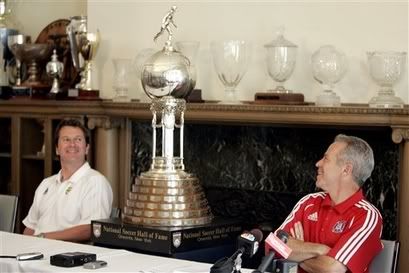2005 Attendance: What We Know Now
| I'm sure by now most of you have read the amazing story out of the San Diego Union-Tribune, where the attendance numbers of MLS are de-mystified and fully explained. Average MLS Attendance
So basically, MLS lies about the attendance to the tune of 1,282 fans per game. That's 9.3%, just made up out of thin air. MLS President Mark Abbott offers some weak explanations about why the announced number is higher than the distributed, but don't buy it: "In 11 straight matches at Columbus, it was exactly 1,000 people higher." At the very least it's incredibly lazy and inaccurate. Team by Team
It's always disappointing when people lie to you. San Jose fans have to be especially upset after seeing how their team is 6th is paid attendance (vs 8th in announced). But I think everybody already expected the lying, and it's not uncommon for sports teams to do that sort of thing. Doesn't make it right though. Now, I want to post the lists Andy_B did on Bigsoccer, aka the "fudge factors," along with the comps percentage that he also did. Fudge Factors
So what can we take from all this? I don't think there's anything really too shocking. It was obvious that MLS gave away a lot of comps, and that the real attendance was lower than the announced. It was published previously in a NJ article that the turnstile counts for the Metros in 2004/5 were 64.8% and 61.3% of the announced number, and actually closer to 50% if you take out doubleheaders. As I've mentioned before, the important thing now is to get stadiums built. Once the league is profitable, then you can improve level of play and marketing which will then increase the fan base. Ziegler in the article says that sponsors did not have access to this "Game Attendance Summary," although Radioshack says they aren't bothered by it. I'm sure that they know exactly what's going on before putting their money in. That's why this report doesn't matter much, because the league is getting tons of new money regardless. In a way, the fact that such a story is being written about the league is a sign that MLS is moving up. I remember back when contraction occured that I was actually happy that the league didn't get much media coverage. With increased coverage comes increased criticism and pressure, and that's a good thing. Paul Gardner and Grahame Jones were just ahead of their time. |




